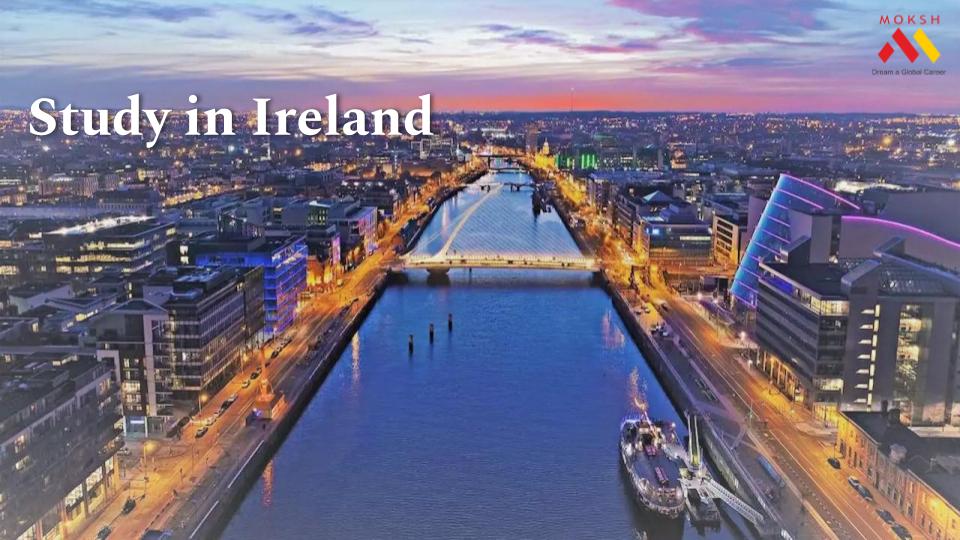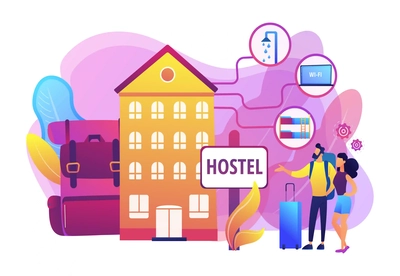
Life in Ireland
Ireland is an island in the North Atlantic Ocean situated in Northwestern Europe. Dublin is the capital of Ireland. The currency of Ireland is Euro (EUR), represented by the symbol €. In addition, the third-largest island in Europe, with a population of 5 million habitants.
The Irish people are eminent for their friendly nature and generous behavior. Along with a vibrant culture, Ireland offers several opportunities that promote professional growth. Besides this, the country not only provides academics that go beyond the educational curriculum but also enables you to earn rewarding entrepreneurial skills.
Climate of Ireland
The climate of Ireland is very moderate and lacks extremes temperature followed by mild winters. However, summers are cool as compared to other parts of Europe. Also, the country receives an abundant amount of rainfall.
January and February are the coldest months, and July and August are the warmest of the year. During the Winter Season, the minimum temperatures range from 0 to −4 °C, while during the summer season range from 32°C to 35°C

Education in Ireland
Are you exploring options available to achieve the goal of studying abroad? Here’s what Ireland has to offer - Ireland holds the top 20th country ranking in the world. The country is admired for its exceptional quality of life, peace, and human development rate. Nonetheless, Ireland is gradually becoming a top preference among Indian students.
Regardless of what subject field you're willing to choose, from Humanities to Engineering, the Irish institution has it all to match your agenda to study abroad. Over 2,000+ study programs in the disciplines of Art, Computer Science, IT, Humanities, Law, Engineering, Media, Business & Management, Medicine & Health, Social Sciences, etc., are available.
Whether you’re an international resident or a local individual, public institutions provide free education for everyone who lives within the country's border. Nonetheless, students must be able to meet the cost of meals, uniforms, travel or transportation, and further expenses. Moreover, the higher education system aims at memorizing stuff and practicing skills rather than focusing on the theoretical part. Indeed, the country has a top-tier education system.
As of QS World University Rankings 2023, 8 Irish Universities are listed out of 1000 participating universities. Moreover, five of them are positioned among the Top 500 World Ranking Universities, namely, Trinity College Dublin (TCD), University College Dublin (UCD), National University of Ireland, Galway (NUIG), University College Cork (UCC), and Dublin City University (DCU). In addition, the top-ranking university Trinity College Dublin (TCD) of Ireland held the 101st ranking globally.
Facts and Figures about Studying in Ireland
If you're considering studying in Ireland, here are some interesting facts and figures to help you get a better sense of what it's like to be a student in Ireland:
- Ireland is ranked among World’s Top 20 Countries in terms of the quality of life, peace, and human development it offers.
- There are eight universities in Ireland, all of which are recognized internationally for their high academic standards and research output.
- More than 40,000 international students from over 160 countries are a part of Irish institutions.
- Certainly, the Irish education style matches world-class standards and offers up-to-the-minute, progressive, and potential career possibilities.
- Also, while communicating with the people around just to ask something or get directions, there’s no way of getting lost in translation.
- In addition to universities, there are 14 institutes of technology and several other specialized colleges and institutions offering a wide range of courses and programs.

Advantages of studying in Ireland
Studying in Ireland has its rewards; reasons that make it a selective place are as follows-
1. High-quality education:
Ireland is home to some of the best universities in the world, and offers quality educational programs, enabling students to unlock their potential to the fullest.
2.English-speaking country:
Ireland is an English-speaking country, making it an ideal destination for international students who want to improve their English language skills.
3. Scholarship opportunities:
Irish Universities offers plenty of scholarship programs for national and international students, with these scholarship programs students can easily gain infinite benefits.
4. Access to the EU:
Ireland is a member of the European Union, which provides international students with access to a range of opportunities for travel, work, and study throughout Europe.
5. Affordable cost of living:
Compared to other popular study destinations like the US and the UK, Ireland has a relatively low cost of living, making it a more affordable option for international students.
6. Work Opportunities:
Ireland offers a range of opportunities for international students to gain work experience while studying, which can help improve their career prospects after graduation.
7. Option to stay and work:
After completing their studies, international students in Ireland have a range of options for staying and working in the country, with opportunities for employment and further study available in a variety of fields.
Overall, Ireland offers a unique combination of high-quality education, a welcoming environment, and a rich cultural heritage, making it an attractive destination for international students.
Medium of Instruction in Ireland
Ireland aims to offer an extensive range of study programs to the local and permanent residents as well. However, quite a few international schools provide programs that are English-taught at all levels. Additionally, Irish higher education institutions currently offer more than 500 Bachelor's and Master's degree programs in the English language.
Popular Programs in Ireland
Choosing the right career path is an important decision to make. It requires proper guidance and direction. With so many career choices available, one can get anxious. Some of the best courses in Ireland for Indian students include-

- Business Analytics
- Data Science
- Software engineering
- Banking & Finance
- Pharmaceutical sciences
- Data Analytics
- Cyber Security
- Cloud Computing
- Digital Marketing
- Artificial Intelligence

Program Intake
The Irish Universities offer two main intakes each year: Autumn intake (September) and spring intake (January). Generally, most students prefer fall intake to study in Ireland, as it will give them enough time to be conditioned to the studies and the environment.
| Intake | Month | Last Date to Apply |
|---|---|---|
| Autumn | September 2023 | 1st June 2023 |
| Spring | February 2024 | 15th Nov 2023 |
Note: Do proper research on the university application date, for which you wish to study, and make sure you apply at least a month prior deadline.
Eligibility Criteria for Admission
For admission to Irish universities, the candidate must meet the requirements stated below-
- A minimum score is 55% and above in the 10+2 Standard.
- The student should have attained 18 years of age or above.
- Any English proficiency tests like IELTS or TOEFL are not mandatory.
- Some Universities may ask for higher academics or additional qualifications depending on their program.

Documents Required
For admission, the students are required to submit the following documents mentioned below –
- Transcripts or records of grades (High school and/or University Leaving Certificate)
- Passport or ID card (with validity to the duration of your stay)
- Passport-sized photographs
- Motivation letter or statement of purpose (if asked by the university)
- Proof of English-language proficiency.
- Application fee.
The cost of study in Ireland
In general, study courses such as humanities, arts and education, and are slightly low-cost whilst subjects in the vein of engineering, medicine, business, and management are likely to be pricier. The cost of study in Ireland, for both undergraduate and graduate levels, would range from €9,000 to €45,000 per academic year. However, the cost varies greatly depending on the program, university, and location.
| S.no. | Study program | Average fees (in Euros*) |
|---|---|---|
| 1 | Undergraduate program | €9,500 to €25,500 annually |
| 2 | Postgraduate masters degree | €9,500 to €44,500 annually |

Scholarship in Ireland
Irish Universities run diverse scholarship programs for national and international students as well. The scholars also get the chance to carry on their higher education at partnered universities.
However, the call for application for these scholarship programs has to be made by the students beforehand. Any student willing to Study in Ireland must keep track of the deadline dates for scholarship application.
Some of the scholarship programs offered in Ireland are mentioned below-
- The Government of Ireland International Education Scholarship,
- The Walsh Fellowship
- Government of Ireland Postgraduate Scholarship
Under these initiatives, scholarships are granted for Bachelor, Master, or Ph.D. levels. Upon securing the scholarship, you will receive a stipend, and fully funded tuition while your academics are to study in an Irish higher education institution. Remember that: The applications for scholarships and their deadline date may vary depending on the category of the program.

Hostel or Accommodation in Ireland
An international student can juggle the options when looking for accommodation in Ireland. Students can either go for the established student housing foundations or private accommodation. The average monthly rent for a single room (shared basis) in a student flat would range from EUR 200 – EUR 400. Additionally, single apartments or family flats are available, but the rented ones might be more costly than the non-shared apartments, and they often have long waiting lists.
Nonetheless, the student must check for accommodation options at the university or other locally available student accommodation alternatives beforehand. You can find the related information on the website of your Irish university.
Cost of living in Ireland
The cost of living in Ireland is 10% lesser than the cost of living in the USA. Nonetheless, the living cost in bigger cities is typically higher than that of smaller cities or towns. The total cost of living for students (including food, accommodation, travel, etc.) approximately would be around €250 – €300. However, the overall monthly expenses would depend on the location you decide to reside and your living habits too.
Indian Students in Ireland
Ireland offers low-cost study programs, excellent academic institutions, high-quality life, and so on. And hence, the affordability of study programs is an appealing feature that draws more and more international students. Moreover, International students mainly prefer to study in Ireland due to its inexpensive cost of living. In addition, Irish Universities offer qualitative education, making it the finest location for students keen to study abroad. And currently, more than 500 Indian students are enrolled under different study programs at Irish Universities.
Part-Time Jobs
As per the Law, an International student enrolled in full-time study (minimum one-year duration) recognized by the Government of Ireland holds the right to work Part-time jobs in Ireland. In addition, depending on the job role, one can earn up to €600 to €1000 for 20-40 hours of work per week. On average, one can easily make 10-15 Euros per hour (minimum wage is €10.50 per hour). So, one can earn 800-1200 Euros per month depending on the part-time job role in Ireland, which is good enough to manage travel, education, and other monthly expenses.
Visa Processing in Ireland
In Ireland, the visa processing time may take up to 15 working days. Thus, the students are suggested to start the visa application process as early as possible. However, it is always best to do so two months before students plan on moving to Study in Ireland.
Post Study Work Permit (PSWP) in Ireland
Ireland is one of the English-speaking countries in Europe that offers post-study work. An international student pursuing a bachelor's or master's degree in Ireland not only has access to the best quality education but is also permitted to look for job opportunities post-study.
While studying in Ireland, you can apply for a Post-study Work Visa (PSW) to stay back and get employed after graduation. However, the duration of your post-study work visa will depend on the level of your study course. The Ireland post-study work visa duration is 2 years for postgraduate degree holders, and 3-4 years for undergraduate degree holders.
Job Opportunities

Ireland is a land with abundant opportunities for students, in terms of study and work in the country. Regardless of the necessity of visas and work permits, working in Ireland as an outcast is not as difficult as it is in other countries. English being the globally spoken language is one of the foremost reasons why a range of multinational businesses are based in European counties.
Ireland is home to over a thousand world-leading multinational companies such as Apple, Google, Facebook, Microsoft, LinkedIn, HP, IBM, and so on.The number of employed people in Ireland constantly amplified between 2022 and 2023 by in total of 0.02 million people (+0.8 percent). This number is estimated to amount to 2.53 million people in the coming year.Overall, this reflects a positive light on the economic stability of the nation. And hence, job exploration and employability will be on the rise.
Under the National Minimum Wage Act 2000, almost every employee is entitled to a minimum wage. In Ireland, as of 1st Jan 2023, the national minimum wage is €11.30 per hour. After completing the Graduation or Post-graduation program, students have the chance to earn a wholesome income of 40,000 - 60,000 EUR. However, at the time of receiving a job offer, it is normal for pay negotiations to happen.
You can refer to the table given below for the most preferred job titles in Ireland and the average salaries offered – (1 Euro = ~85 INR)
| Preferred Job Roles in Ireland | Average Salaries (Per Year) |
|---|---|
| Allied Healthcare Professional | EUR 35,000 |
| Business Manager | EUR 50,000 |
| Engineer | EUR 40,000 |
| Finance / Investment / Accounting Manager | EUR 75,000 |
| Financial Analyst | EUR 40,000 |
| Hospitality / Tourism | EUR 60,000 |
| Marketing Manager | EUR 60,000 |



